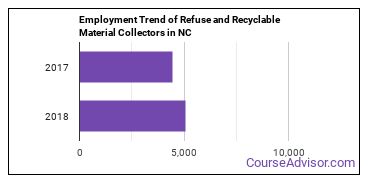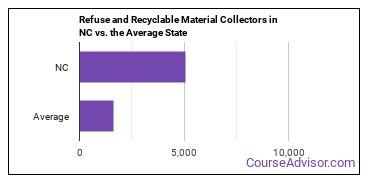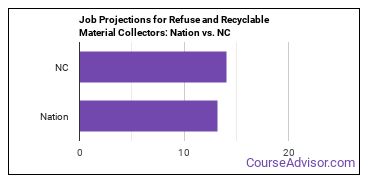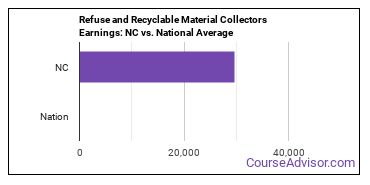Refuse and Recyclable Material Collectors in North Carolina
Want to work in North Carolina as a Refuse and Recyclable Material Collector? Read this first!
You’re in luck! Jobs for Refuse and Recyclable Material Collectors in North Carolina are projected to grow and these jobs tend to pay higher than average.
-
Projected employment for Refuse and Recyclable Material Collectors in North Carolina is growing faster than average.
-
Refuse and Recyclable Material Collectors in North Carolina earn lower salaries than the typical U.S. wage earner.
Featured schools near , edit
How Many Refuse and Recyclable Material Collectors Work in North Carolina?
5,070 people worked as Refuse and Recyclable Material Collectors in 2018 in this state.
There were 4,430 Refuse and Recyclable Material Collectors employed in this state in 2017.
That’s growth of 640 jobs between 2017 and 2018.

The typical state has 1,630 Refuse and Recyclable Material Collectors working in it, which means North Carolina has more Refuse and Recyclable Material Collectors than average.

Job Projections for North Carolina
Jobs for Refuse and Recyclable Material Collectors in this state are growing at a rate of 14.1% which is faster than the nationwide estimated projection of 13.2%.

North Carolina Annual Job Openings
The BLS is projecting 660 annual Refuse and Recyclable Material Collectors job openings in North Carolina, and 5,350 total jobs in the year 2026.
Nationwide, the prediction is 18,900 annual jobs and 153,900 total jobs in 2026.
What do Refuse and Recyclable Material Collectors Make in North Carolina?
In 2018 wages for Refuse and Recyclable Material Collectors ranged from $17,770 to $40,750 with $29,710 being the median annual salary.
Broken down to an hourly rate, workers in this field made anywhere from $8.54 to $19.59. The median hourly rate was $14.28.
Workers in this field were paid a median of $14.1 an hour in 2017.
The hourly rate grew by $0.18.
The median salary in North Carolina is higher than the nationwide median salary.

Top North Carolina Metros for Refuse and Recyclable Material Collectors
The table below shows some of the metros in this state with the most Refuse and Recyclable Material Collectors.
| Metro | Number Employed | Annual Median Salary |
|---|---|---|
| Charlotte-Concord-Gastonia, NC-SC | 1,470 | $31,750 |
| Virginia Beach-Norfolk-Newport News, VA-NC | 610 | $36,690 |
| Raleigh, NC | 490 | $33,450 |
| Greensboro-High Point, NC | 320 | $28,040 |
| Winston-Salem, NC | 260 | $28,490 |
| Durham-Chapel Hill, NC | 220 | $36,540 |
| Hickory-Lenoir-Morganton, NC | 200 | $29,910 |
| Asheville, NC | 150 | $31,370 |
| Myrtle Beach-Conway-North Myrtle Beach, SC-NC | 130 | $29,050 |
| Wilmington, NC | 120 | $31,220 |
| Fayetteville, NC | 90 | $33,000 |
| Greenville, NC | 80 | $33,920 |
| Burlington, NC | 70 | $29,060 |
| Rocky Mount, NC | 60 | n/a |
| Goldsboro, NC | 60 | $32,960 |
Top States for Refuse and Recyclable Material Collectors Employment
The table below shows the states where most Refuse and Recyclable Material Collectors work.
| State | Number Employed | Annual Median Salary |
|---|---|---|
| California | 13,130 | $51,600 |
| New York | 10,480 | $59,440 |
| Texas | 9,050 | $34,370 |
| Florida | 5,810 | $35,900 |
| North Carolina | 5,070 | $29,710 |
| Michigan | 4,450 | $42,280 |
| Illinois | 4,420 | $66,130 |
| Ohio | 4,100 | $37,310 |
| Georgia | 3,350 | $31,180 |
| Pennsylvania | 3,310 | $37,260 |
| Virginia | 3,080 | $31,090 |
| Tennessee | 2,710 | $29,470 |
| Maryland | 2,480 | $28,570 |
| Washington | 2,450 | $52,780 |
| Alabama | 2,450 | $30,180 |
| Arizona | 2,400 | $39,650 |
| Colorado | 2,340 | $40,840 |
| Oregon | 2,250 | $44,980 |
| South Carolina | 2,240 | $22,990 |
| Wisconsin | 2,200 | $42,160 |
Below are the states where Refuse and Recyclable Material Collectors get paid the most:
| State | Annual Median Salary |
|---|---|
| Illinois | $66,130 |
| New York | $59,440 |
| Washington | $52,780 |
| California | $51,600 |
| Alaska | $47,550 |
| Connecticut | $45,120 |
| Oregon | $44,980 |
| Michigan | $42,280 |
| Wisconsin | $42,160 |
| Delaware | $42,110 |
References
- Bureau of Labor Statistics (BLS)
- College Factual
- National Center for Education Statistics
- O*NET Online
More about our data sources and methodologies.
Featured Schools
 Request Info
Request Info
|
Southern New Hampshire University You have goals. Southern New Hampshire University can help you get there. Whether you need a bachelor's degree to get into a career or want a master's degree to move up in your current career, SNHU has an online program for you. Find your degree from over 200 online programs. Learn More > |
